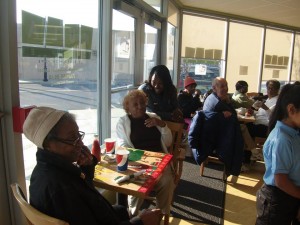Asbury Park’s Acting Police Chief Announces Retirement
Salerno: I Left It Better Than I Found It
Deputy Chief Anthony Salerno retires May 1 but due to the claiming of unused vacation days, his last day of duty will be Monday.
Among his last acts of active service was Monday morning’s advancement of officers who ‘have served with dedication despite one of the lowest pay rate in Monmouth County,’ Salerno said. His descriptions of the officers service also included ‘perseverance and honest hard work.’
Acting Deputy Chief David Kelso’s role was made official as he takes on the duty of running the 86 member department on May 1. 
“David has been my right arm,” Salerno said. “He’s been a very loyal and hardworking Acting Deputy Chief and today we get an opportunity to make it official by swearing him in as [provisional] Deputy Chief.”
Other promotions included those to the rank of captain for Guy Thompson, John Crescio, and Terrance Fellenz; and sergeant for Joe Spallina and Michael Casey.
“We are not promoting them, they promoted themselves,” Salerno said during the advancement ceremony.
Salerno began service with the Asbury Park Police Department in July 1988. He served as a patrolman prior to advancement in 1995 to the Detective Bureau where he worked on domestic violence and sexual assault crimes, as well as working homicide cases in conjunction with the Monmouth County Prosecutor’s Office Major Crimes unit. He was named Acting Chief in 2014.
During his tenure, crime dropped to its lowest point since 1979, according to Uniform Crime Reporting data.
While calls for service briefly peaked to 37,985 in 2015, an 11.8 percent increase over 2014, it quickly stabilized in 2016, due in part to enforcement measurements implemented in high crime reported areas.
Salerno credits the implementation of basic policing he learned while on foot patrol as a young officer for the success of his tenure.
“Back in the day, they used to assign people to walking posts when they wanted to punish you,” Salerno said. At the time he was, admittedly, an outspoken new officer coming from a background in restaurant management in New York City. ““I had a big mouth, and thought things should be a certain way.”
He was assigned to walk Boston Way and Asbury Park Village.
“It was the best thing that ever happened to me,” he said. “I [not only] got to know the people by name but the best lesson I ever learned is that good people live in bad neighborhoods. As a police officer, you go through the police academy with that gung-ho lock up the bad ‘perp’ mentality and it dehumanizes you. Then they put you in a police car and it dehumanizes you even more; it isolates you from the public.”
When Salerno took the helm in 2014, his immediate mandates were simple – show up for work, do something while at work, and wear a uniform, he said. The mandates were set to address an abuse of sick time; and officers who did little policing while on duty; and to foster professionalism across the force.
The changes resulted in six police officers being fired or forced into resignation.
Community Policing then became the foundation of Salerno’s policies.
“It really came down to a couple of fundamental things,” he said. “Develop a relationship of mutual respect with the public, which is why I almost tripled the amount of community policing projects.”
This included building on the police chaplain’s program through a continual relationship with 11 pastors from city churches, expanding on the police cadet training program, and the summer boot camp, which sells out every year.
He brought back foot patrols in the high crime areas, implemented a bicycle patrol program, helped foster the school resource officer relationship, and after two officers were fired for drug use, brought back random drug testing.
“We made a huge impact on the west side with not only deterring crime but with also building relationships,” Salerno said. “You have to be careful that you are not perceived as a police state.”
But complaints of lack of policing in the southwest quadrant led to the ability to triple the number of police officers assigned to areas where known crime activity was occurring, he said.
“I put cops where the dots were,” he said. “Wherever there was a crime we put dots on the map.”
Salerno also grew the street crimes unit, the team responsible for investigating narcotic and gang activity.
“They were operating on a part time basis,” he said. “We doubled that and made it a seven day a week project.”
Updating the department’s technology also became paramount.
He partnered with the school district to install fiber optics throughout the city, which laid the groundwork for the installation of 62 high definition cameras capable of turning, tilting and zooming in to better capture crime activity.
This past year, all field officers were given body worn cameras, resulting in fewer police abuse reports and an increase in the prosecution of crimes, he said.
Born and raised in Asbury Park, Salerno attended Our Lady of Mt. Carmel School and Bradley Elementary School and graduated from Asbury Park High School. He has served 29 years with the Asbury Park Police Department.
The cases that remain with him today include the brutal killing of Ann King in 1998, an elderly woman who had been a long time resident of the city. He said she was  bludgeoned to death with a bag filled with ceramic mugs in her foyer; a scene he can still recall. Salerno helped solve the case when he returned two days later to the Asbury Avenue home. His follow up investigation led to the discovery that the suspect, the boyfriend of a girl who lived next door, had used a window to make his entry and escape from the home with stolen foreign coins.
bludgeoned to death with a bag filled with ceramic mugs in her foyer; a scene he can still recall. Salerno helped solve the case when he returned two days later to the Asbury Avenue home. His follow up investigation led to the discovery that the suspect, the boyfriend of a girl who lived next door, had used a window to make his entry and escape from the home with stolen foreign coins.
He said the 1995 shooting of a four year old girl at a Boston Way apartment remains with him. The young girl was leaning out the window watching other kids play when she was inadvertently struck by a bullet during a drive by shooting. She died from the injury.
The team of police officers ceremoniously promoted Monday will begin their new duties on May 1, when his salary comes off the payroll.
The department is currently in the midst of the New Jersey State Association of Chiefs of Police [NJSACOP] accreditation process, a measure that will result in better accountability, efficiency and response to community needs.
Salerno said the city’s population swells from 17,000 to over 125,000 on the weekends.
“The primary challenge and goal is to keep up with the expansive growth of the city,” he said.
Despite Asbury Park’s revitalization, it remains one of the lowest paid departments in Monmouth County. On average, a police officer makes $30,000 less than those in surrounding communities, he said.
Most police captains in surrounding communities who are two ranks lower, make in excess of $160,000 annually, compared to Salerno’s $133,000 annual salary.
“This disparity in salaries will have a devastating affect on the police departments ability to attract and retain qualified police officers and commanders,” Salerno said.
He attributes that to a union bargaining that allowed officers to take a lower pay in lieu of not contributing to insurance payments but state laws now mandate that all public employees must contribute to their insurance coverage.
A second factor is that the city is currently on transitional aid and with the 2 percent budget cap makes it difficult, even through collective bargaining, to get the police salaries to a competitive rate. The result is that Asbury Park is becoming a training ground for new police officers who ultimately leave to serve other communities at the cities expense.
An officer making $100,000 in Asbury Park can go to the Prosecutor’s Office and make $129,000 for the same level position, he said.
The Asbury Park Police Department currently has 86 officers on its roster. Salerno said they are in the process of hiring six officers to replace those who have left. While a state shows a need for a 102, Salerno said the department could run efficiently with 98 officers.
Salerno, a Howell resident, said he will spend the summer with his family and playing golf before making a decision on whether to take one of two job possibilities now on the table, hinting that one may be local work with the federal government.
“I feel very good about where the department is and I feel very good about my timing in leaving,” he said. “I left it better than I found it.”
————————————————————————
Follow the Asbury Park Sun on Facebook, Twitter and Instagram.
The Asbury Park Sun is affiliated with the triCityNews newspaper.

















